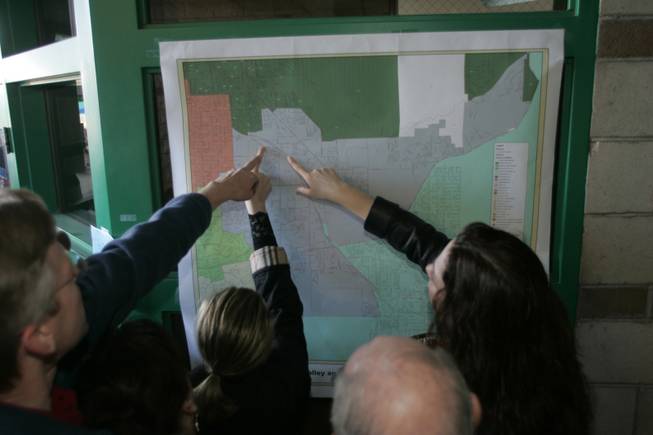
Voters look for their precincts on a map during the Republican presidential caucus at Green Valley High School in Henderson Saturday, January 19, 2008.
Tuesday, Jan. 31, 2012 | 2 a.m.
You’re scrambling to look for a job or working overtime to keep the one you have. Your house is underwater. The kids need rides to soccer practice.
With all that to occupy your mind, there’s no shame if you only now glance up to see a guy named Santorum running ads on Nevada TV and wonder, “What the heck is going on?”
The short answer: the Nevada Republican caucus.
If you want to participate, this primer is for you.
What’s the hoopla about?
Saturday is the Nevada Republican caucus, where registered GOP voters will help select the Republican nominee to challenge President Barack Obama.
Because Nevada is the fifth state to vote (following Iowa, New Hampshire, South Carolina and Florida, which holds its primary today) Republicans here have an outsize opportunity to influence the course of the presidential race — potentially cement a front-runner, extend the indecision or otherwise make national headlines.
Four Republican candidates remain: former Massachusetts Gov. Mitt Romney; former Speaker Newt Gingrich; Rep. Ron Paul, R-Texas; and former Pennsylvania Sen. Rick Santorum.
A different candidate has won in each state that has voted so far. And while today’s Florida’s primary could go a long way to determining the eventual nominee, state party Chairwoman Amy Tarkanian has billed Nevada as the tiebreaker state, in addition to its being “first in the West.”
What the heck is a caucus?
A caucus is a meeting with neighbors and friends. Republicans will gather at 40 locations in Clark County, 125 locations across Nevada. To find the site where you should attend, visit the party’s caucus website or call the Nevada Republican Party at (702) 258-9182.
Every county can set its own rules, and start times vary. In Clark County, doors open at 8 a.m. and meetings start at 9 a.m. (An exception is a caucus for those who observe a Saturday Sabbath. The special caucus will be held at 7 p.m. at the Adelson Education Campus in Las Vegas.)
In Washoe County, doors open at 9 a.m. and meetings start at 10 a.m.
There will be party business to attend to — delegates, alternate delegates, party platforms, etc. People can give two-minute speeches endorsing a candidate, but you don’t have to speak. In fact, voters will cast anonymous paper ballots.
Why can’t it just be a primary?
Nevada has traditionally held caucuses, but no one beyond the party faithful ever noticed. That’s because in the past, by the time Nevada voted, presidential nominees were almost always decided. State legislation to make Nevada a primary state has gone nowhere.
While a caucus meeting has been described as the “Tupperware party from hell,” party officials have emphasized that it can be a quick and painless process for those who just want a say in the presidential race (and don’t have $10 million).
Party officials said that, depending on the precinct, voters could be done in 20 to 30 minutes.
Can anyone go?
Only registered Republicans can participate. The cutoff to register as a Republican for the caucus was Jan. 20. You also must have a valid photo ID.
To find your caucus location, go here.
A proposal to allow same-day registration, like Democrats did to in 2008, was nixed because of concerns about Democrats infiltrating the system. (Democrats, incidentally, turned their “open caucus” into big voter registration gains.)
Will the presidential candidates be here?
Santorum and Paul are scheduled to be here today. And Romney and Gingrich are expected to visit Nevada in the coming days.

Join the Discussion:
Check this out for a full explanation of our conversion to the LiveFyre commenting system and instructions on how to sign up for an account.
Full comments policy